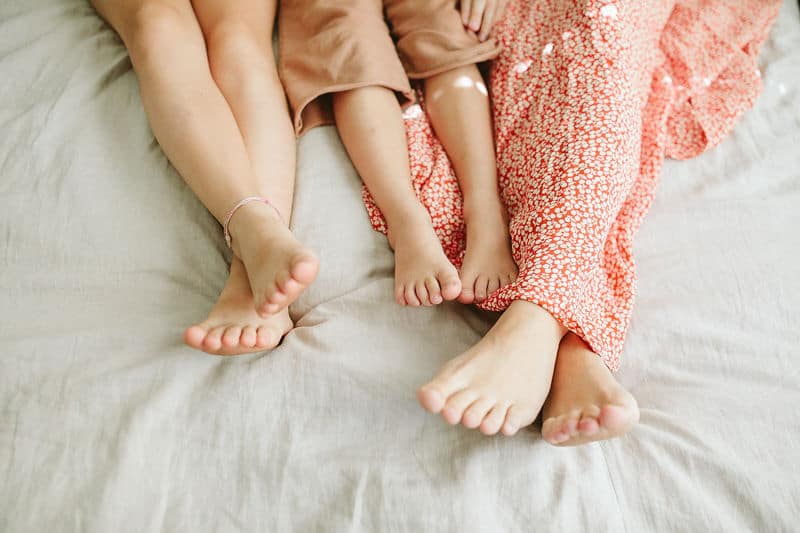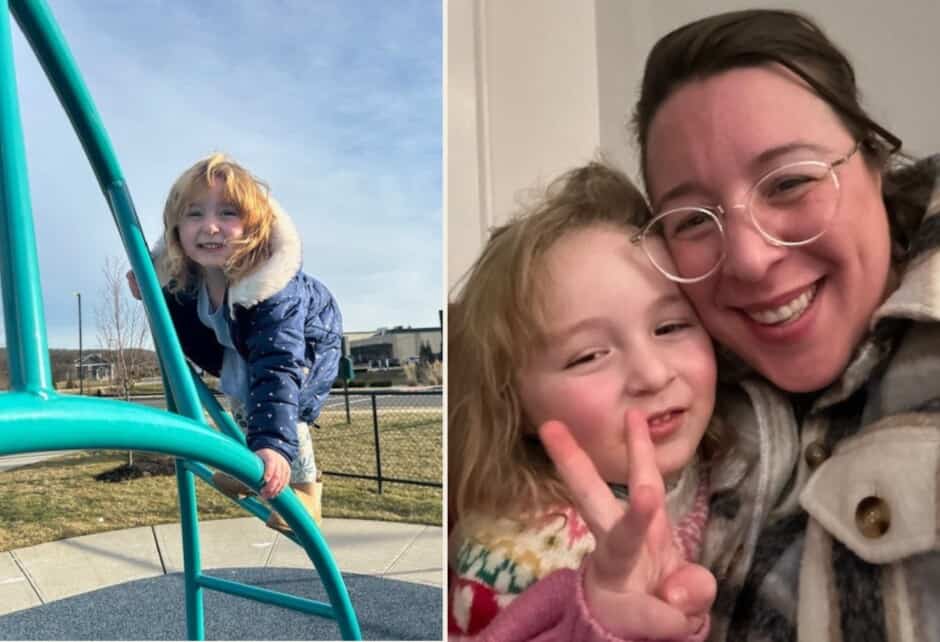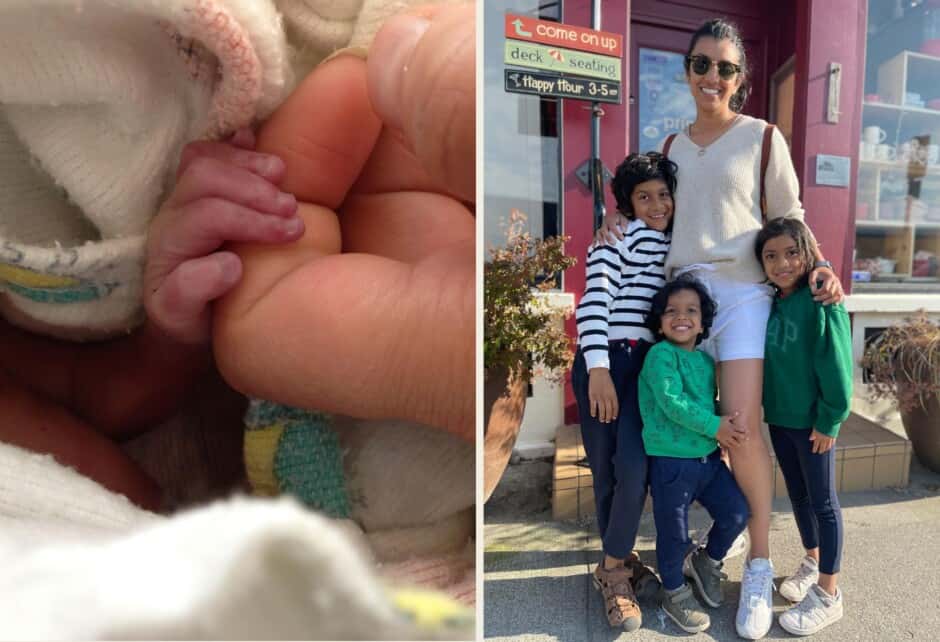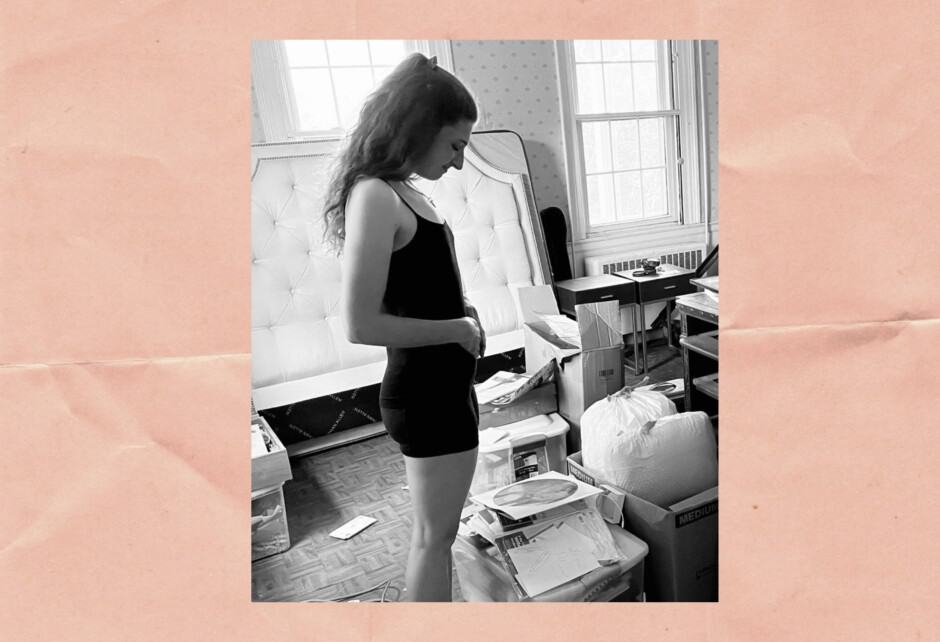
Mom Talk: On Co-Sleeping and Pandemics
Written by Rachel Medley Prince
Photography by Photographed by Paige Jones
As multiple studies have shown, the uptick in anxiety during the pandemic isn’t just for grownups. Kids are feeling stressed from these uncertain times, too. Below, Oakland mother of three, Rachel Medley Prince, shares her personal experience of dealing with anxiety as a young adult, and how she’s using one of her tried-and-true coping methods—co-sleeping—to help one of her struggling children.
It is 9:30pm and our 8-year-old is out of her bed. Again. It is maybe the third time she has come out in the last ten minutes.
I have just settled into the couch with a mug of tea. This is my one precious hour of not having to take care of anyone else, of time alone with my husband. But here is my Clara, scowling at me, her long red hair already falling in tangles, freckles glowing on her pale face.
“I can’t sleep,” she says, irritation rimming her voice. She glowers at me.
As if it is my fault she cannot sleep.
Well, of course, it’s my fault, I think. It’s always the mom’s fault.
I also know that she is very upset. That she is feeling unmoored and a little bit panicked.
“Clara,” I say, as patiently as I can muster. I am so desperate for some down time. “It’s going to be okay, honey.”
Survival parenting is exhausting. This constant meeting of our children’s needs. And right now, with all this uncertainty, those needs are so much more than basic. Maybe not since infancy do we represent so much to them. We are once again the time keepers, the sleep measurers, the feeders. My girls’ constant requests for food reminds me of those early days of breastfeeding. When I’d feel like I’d just finished feeding them only to find them rooting for me again.
They are “rooting” for me all the time now. “Mama!” echoes through the house seconds after I descend downstairs for something.
Clara, who I so consistently sleep trained, who I could put down awake and walk out of the room to the sounds of her soft cooing only to have her fall asleep on her own a few minutes later, was no longer that dream baby. My middle child, Clara has always been my easiest—open to new things, laid-back when it comes to a change in plans, able to make friends easily. But recently, whether due to Covid stress or her own blossoming identity, she has become a bit more layered.
“Are you thinking about anything?” I ask her.
“Nothing,” she says in exasperation.
“Are you worried about something? Is something bothering you?” I ask again, pulling her close to me in a hug.
“No,” she insists.
I try to quiet the worry creeping into my heart. “Don’t be like me,” I pray. But she is. I’ve bequeathed her not only my stubborn nature but also my tendency toward anxiety. Anxiety and I are old friends.
In my early twenties, my anxiety once so took hold of my pink matter that I went from my standard nine hours per night to maybe three or four. I was fresh out of college and feeling unmoored, possibly akin to what my girls are feeling now. One of my younger brothers began to struggle with his own mental health issues, and my mom called me daily to descend into tears over how worried she was over his erratic behavior. The stress of this was already making sleep difficult, and then 9/11 happened. Regular life felt a little like an injustice against all those who had died. Kind of like how it feels now.
I went to therapy, then acupuncture. I listened to recordings of chanting monks at bedtime. I kept up my yoga, until my exhaustion grew so profound I no longer had the energy for it. My doctor gave me sleeping pills with the warning that they were addictive. Coming from a family of addicts this gave me pause. I tried not to use them, but I did, and soon found myself fantasizing about them all day. They were terrifying and fortifying—they dropped me into blackness and made me disappear. The relief of disappearing made me hungry for more, though I wasn’t really resting. I continued to fray, my edges shredding away from me. My insomnia undid me. I cried every day. My body hurt everywhere. I had somehow developed enough inflammation in my ribs to mimic arthritis. I was five months into this nightmare and I didn’t see any way out. I was terrified of becoming addicted to sleeping pills, terrified that I had lost my ability to sleep. I finally said yes to an SSRI. Three weeks later I was falling asleep again. Blissful, soul-feeding, brain-tending sleep. This saved me.
Maybe my insomnia was partly why I became such a sleep obsessive when I had children. I was determined to do sleep right with them.
Our eldest, who we adopted when she was a toddler, came home sleeping through the night. Clara, I was determined, would learn to sleep as well as her big sister, and so as soon as she hit that magic 11 pounds I began to sleep train. It took two nights. She hardly cried. We tried to hide our smugness in conversations with other new parents, who were bleary eyed and wrecked from constant baby waking.
Then, just before she turned 2, it seemed as though a switch flipped. Clara suddenly seemed afraid at bedtime. She unleashed the kind of cry that in the library of baby cries, sounded to me like fear—horrible, high pitched shrieking and screaming like something with teeth was after her. We started lying with her in our guest bed until she fell asleep and then transferring her an hour or two later to her crib. Not easy with a 20-something pound dead weight. It mostly worked. But there were also nights when she woke when we moved her, her eyes wild with fear. She’d scream her head off while my husband and I sat on the floor outside her door defeated. I read that sometimes moving a child into a room with their sibling solved the problem. It did, and once again, it seemed the sleep experts were right. Until she discovered she could crawl out of her bed, walk down the hall, and crawl into ours.
This went on for too long. I blame laziness on our part. When our eldest daughter asked if she could sleep with us every night too we knew we had to get Clara back into her own bed. It took months, but she finally began sleeping through the night in her own bed again. Then we had our third.
Mae fought sleep from day one. When she was just weeks old she would stay awake for 5 and 6 hours straight. A newborn! Wasn’t that against some law of life? She’d quietly watch us wide-eyed, smiling, taking it all in.
She continued to fight me at every nap and bedtime. She cried every time we tried to put her down. We rocked her to sleep every night, the little co-dependent angel. She started to flip herself out of her crib around fourteen months and I panicked. We moved her in with her sisters, shoving her crib mattress against a wall. Of course this one realized right away that she could get out and come find us down the hall. At this point, I was too old and much too tired to haul myself from my cozy bed to put her back.
Well, at least the other two were sorted, we consoled ourselves.
Then the pandemic hit.
Pandemics are funny things, aren’t they? They strike every hundred years, so one generation cannot pass wisdom down to the next. We’re on our own here. These are uncharted waters for parents. How to tell them it’s going to be all right when even we don’t know if it will? Every time there’s a bit of good news, a bit of bad seems to follow, and what persists is the uncertainty of it all.
No one can ever be prepared for one—shrink your life down to what is most basic, undo your routines, toss human connection to the wayside. Three girls has likely made this an easier time for us. When one gets sick of another one they can trade off to the third. I pity the only children, those without built-in playmates that siblings can be to each other.
Instead of making my older two girls read on their Zoom breaks, I encourage them to play. And play they do. If they want to run around half the day acting out the secret lives of their stuffed animals, so be it. Right now, it has to be about joy. All the tiny places we can unearth it.
Still, I’m beginning to see cracks in that mental health we have tried so hard to preserve. It’s hard on them too. In all the small ways.
When Clara first started having trouble in early winter, we simply walked her back to her room, tucked her back in, and talked her through taking some slow deep breaths. We tried mindfulness, chamomile tea, melatonin. But I knew from experience that anxious brains do not feel so tired. They have a disconcerting ability to rev up as soon as we lie down. And Clara continued to get up, each time more and more frustrated and upset about not being able to fall asleep.
Looking back on my own insomnia I realized that what I wanted more than anything during that time was to go home. Nearly every weekend, bleary-eyed with exhaustion, I’d drive myself the hour back to my childhood home and crawl into my old bed. My little sister would snuggle in next to me, as if I’d never left. Her steady, even breathing beside me was an anchor. It didn’t put me back to sleep, but I felt safer there, and not as afraid. It is the feeling I have now, when I call her up and feel instantly at ease, known, loved.
“Let’s try having you sleep with Mae-Mae,” I suggested one night, after Clara had come out of her bed for the umpteenth time.
“But I don’t want to sleep with Mae,” she protested. “I want to sleep in my own bed.”
“You will sleep in your own bed again,” I told her. “But for now, I think it’s better for you not to feel alone. This is what sisters are for.”
This is what sisters—what siblings—are for. I am lucky that this doesn’t all have to fall on me. I may spend all day propping them up, giving hugs, forcing exercise, helping them when they’ve knocked off Zoom yet again. But why not mine the value of a sibling when night comes and I’m exhausted?
They’ve been sleeping together for weeks now. Even our eldest has joined them, we put down a spare mattress on the floor and the older girls take turns sleeping with the littlest. Maybe they spend an extra fifteen minutes whispering to each other, and sometimes one wakes the other up a little bit too early, but they are sleeping. I tell myself that this togetherness can only bring them closer. And maybe it means when things are little too stressful when they are grown, they will know they can always return home, or to each other.
I still believe going to sleep on your own is a skill worth cultivating. But right now what I think we need is pretty basic. Someone breathing next to us in the dark.
Are you a mother with something to say? Send us an email to be considered for our “Mom Talk” column.
Leave a Reply to Maria Rivera Cancel reply
Share this story




Our son for now is our only child. He is 4 and sleep has been hard for him always but especially during this pandemic also. We have sleepover Fridays with mommy and the rest of the week he sleeps with our dog. Sometimes furry family members offer comfort as well!
So beautifully written! We are living so many of the same thIngs with our three kids too. It has been so difficult for parents. How do we come out of this season of loss in one piece?
This is beautiful writing, Rachel. Thank you for sharing.